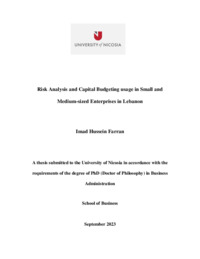Background: Emerging evidence suggests that personality traits can reliably predict dietary and other health-related behaviour patterns and are linked with weight status. Moreover, recent research indicates that “chrononutrition,” or the timing of our meals, is also associated with various health outcomes. However, our understanding of the possible links between personality and chrononutrition and their influence on the development of obesity is currently limited. This leads to the fundamental question: “Do individuals with distinct personality traits tend to make healthier or unhealthier lifestyle choices?” Additionally, “How do these connections evolve in light of a Public Health Emergency of International Concern (PHEIC) such as the ongoing coronavirus pandemic (COVID-19)?” While research on health behaviours and personality traits is growing, the underlying mechanisms remain unclear, and none have explored the link between chrononutrition and personality. This thesis seeks to investigate the relationship between personality and weight status, physical activity (PA), and eating patterns (Studies I & II). It also aims to identify changes in health behaviours (adherence to the Mediterranean Diet (MD) and PA), chrononutrition, and their association with personality during the initial lockdown period (Studies III & IV). The primary hypotheses are that conscientiousness is associated with a lower Body Mass Index (BMI), more consistent eating patterns, and increased PA compared to other personality traits. Furthermore, individuals with high conscientiousness scores are expected to exhibit higher MD adherence and be linked to chrononutrition behaviours such as regular breakfast consumption, meals at consistent times and avoidances of nighttime eating during the COVID-19 lockdown. Methodology: All studies in this thesis were conducted with a sample of adults residing in Qatar. In Study I, a cross-sectional analysis examined the association between personality, measures of adiposity (Body Fat Percentage (BF%) & BMI) and PA in a population of female university students aged 18-25 (n=307) recruited through on-campus advertisements. Study II examined the association of personality and eating patterns through dietary analysis of food records on a sub sample of study I participants (n=169). Study III explored the influence of personality on MD adherence and PA through a prospective study conducted during the COVID-19 lockdown in a population of adults over 18 years old (n=453) recruited via an online questionnaire. Study IV investigated the association between personality and chrononutrition using the same group of participants from study III (n=453). To test these hypotheses, the following assessments were conducted using a prospective approach: anthropometric measurements, 3- day food records, questionnaires consisting of validated tools to measure MD adherence (Mediterranean Diet Adherence Screener (MEDAS), score ranging from 0 to 13), PA (International Physical Activity Questionnaire Short Form (IPAQ SF), assessing light, moderate, high-intensity PA), personality (Big Five Inventory 44 Item (BFI-44), categorizing individuals’ personality traits), and chrononutrition (Chrononutrition Profile Questionnaire (CPQ), assessing chrononutrition preferences and eating misalignment). These variables were then analyzed to detect associations between personality (the main exposure variable) and various outcome variables, such as obesity, PA, dietary habits and chrononutrition. Results: Collectively, the findings from this dissertation revealed that in the studied population: 1) Individuals with higher openness scores had a higher proportion of energy intake from meals and snacks compared to those with higher agreeableness scores (the reference category); 2) Individuals with a conscientious personality were more likely to have regular breakfast consumption compared to those with an agreeable personality (the reference category). For the studies conducted during the COVID-19 lockdown: 3) Adherence to the MD and total PA decreased; 4) Openness personality was associated with nighttime eating, while individuals with high extraversion scores had longer evening latency compared to other personality types; 5) Extraversion and openness facets displayed a shorter eating window compared to other personality facets. Conclusion: In summary, this thesis findings contributes towards filling the gap in existing literature regarding the interplay between personality, chrononutrition, and weight status and how this knowledge can be integrated into the design of future dietary interventions tailored to specific personality traits. Interventions that control the number of meals and the timing of the last meal could potentially enhance the effectiveness of standard weight management programs and improve cardio metabolic health. Furthermore, these findings shed light on this association within a PHEIC like the COVID-19 pandemic. Understanding the lifestyle implications of the COVID 19 infection mitigation measures can aid in making well-informed decisions on suitable strategies for future scenarios. Overall, this work highlights the potential effectiveness of incorporating personality trait assessments to predict and enhance eating behaviours, assisting individuals in achieving their healthy lifestyle goals.


